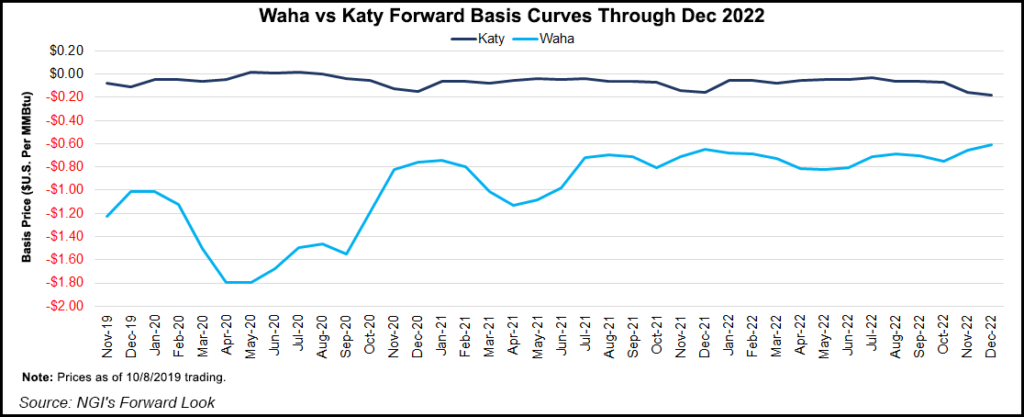Infrastructure | NGI All News Access | Regulatory
Permian Highway Gains Approval to Move Natural Gas in Disputed Area of Texas Hill Country
Kinder Morgan Inc. has agreed to pay $2.7 million to the City of Kyle in the Texas Hill Country near Austin to construct the Permian Highway Pipeline (PHP), a natural gas conduit that would carry 2 Bcf/d from West Texas.

PHP, sanctioned last year, would move supply 430 miles via a 42-inch diameter pipeline from the Waha hub to Katy near Houston, and then connect to Gulf Coast and Mexico markets. It tentatively is set for service by late 2020.
The system is routed through Kyle’s boundaries in Hays County. The Kyle City Council last summer enacted an ordinance specifically targeting PHP, requiring gas pipelines of a certain size to apply for additional permits and have increased oversight.
Following a court challenge by Kinder, Kyle amended the ordinance in September, and it established a framework to resolve PHP issues. The settlement agreement provides the city with additional safeguards, Mayor Travis Mitchell said.
“To be clear, this settlement has nothing to do with rerouting the pipeline out of the Hill Country,” he said. “We still share in the concerns of thousands in our community who fear the impacts of the PHP on our safety and our environment. Settling this case has no bearing on those risks, which would have remained in full force either way.
“In a perfect world,” Mitchell said, “this pipeline would have been routed through unincorporated areas of Texas, preferably those areas already established with oil infrastructure, minimizing the effect on landowners, local governments and our environment.” But “we don’t live in a perfect world.”
The Kyle council and staff worked with the pipeline operator to develop a framework that would protect the city in ways otherwise not granted through state and federal regulations, he said.
“One such protection born from the settlement is that Kinder Morgan is no longer legally allowed to convert the pipeline from natural gas to crude oil. As I see it, this negotiated point can be celebrated by all who have stood with us for the last year.”
The settlement also protects the city from incurring any undue financial burden caused by the pipeline on existing infrastructure, and it requires Kinder to participate in alleviating conflicts between the pipeline and future infrastructure projects in the city.
“The question before our council has been how to leverage our limited city resources to carry this fight against an opponent with virtually unlimited resources,” Mitchell said. “We believe that this settlement agreement represents a better outcome than what we could have expected in a long and drawn out, and expensive, legal battle.”
“While we’re satisfied to have this particular legal proceeding behind us, we remain committed to advocate for Kinder Morgan to build in the most responsible manner possible,” Mitchell said. “This is certainly a step in the right direction, but it is also not the end of this fight.”
The council vote was 5-2, with members Alex Villalobos and Daphne Tenorio opposing the settlement.
Kinder “has the amount of money to ”out-lawsuit us,” Tenorio said. “They have the amount of money to bury us, and I get that. But fundamentally, I can’t move past the idea of them paying to get away from the law.” However, “I really do believe that this is the best deal available to us, and I couldn’t be more proud to be a part of this council.”
Using the U.S. Endangered Species Act (ESA), PHP also has been challenged by Hays County and plaintiffs that include the Travis Audubon Society. The plaintiffs in mid-July filed a notice of intent (NOI) to sue Kinder, the U.S. Army Corps of Engineers and the U.S. Fish and Wildlife Service. Under the ESA, plaintiffs must wait for 60 days to file a lawsuit after an NOI has been filed.
Plaintiffs want an environmental impact study conducted under the National Environmental Policy Act, but the Army Corps said PHP sponsors plan to use the Nationwide Permitting verification process instead. In June, the Travis County District Court crushed a similar challenge.
The ESA prohibits any action that causes a “taking” of any listed species. PHP as designed would cross recharge zones of the Edwards and Edwards-Trinity aquifers, which provide drinking water supplies for more than two million people, as well as habitat for federally listed endangered species that include the golden-cheeked warbler, which nests in dense juniper woodlands of the Texas Hill Country.
PHP is the second Permian-to-Gulf Coast gas project led in part by a Kinder subsidiary. Gulf Coast Express, a 1.92 Bcf/d gas line, ramped up last month to move Permian volumes to the Agua Dulce hub in South Texas near Corpus Christi.
© 2024 Natural Gas Intelligence. All rights reserved.
ISSN © 1532-1231 | ISSN © 2577-9877 |
